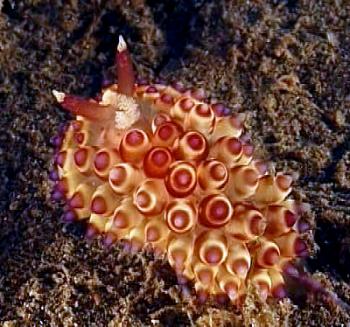
Janolus sp. 4
Order: NUDIBRANCHIA
Suborder: ARMININA
Family: Zephyrinidae
PHOTO
Honiara, Solomon Ids. Photo: Bruce Potter.
Authorship detailsRudman, W.B., 2001 (January 4) Janolus sp. 4 [In] Sea Slug Forum. Australian Museum, Sydney. Available from http://www.seaslugforum.net/find/janosp4
Related messages
Janolus sp. 4 from Lembeh
November 24, 2009
From: Zeineb Alhaidari
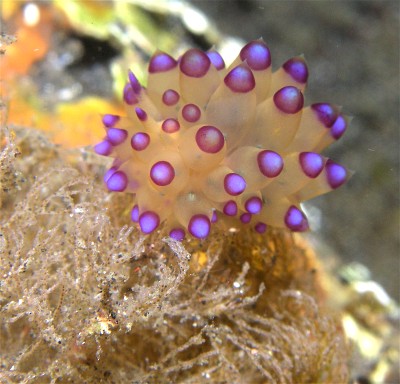
Concerning message #7100:
Dear Bill ,
Is this a Janolus, and if so, could it be Janolus sp. 4 ?
Locality: Dive site : Nudi Falls , Lembeh strait, 10 metres, North Sulawesi , Indonesia, Molucca sea, 05 October 2009, Sandy bottom with scattered reefs. Length: 3 cm. Photographer: Zeineb Alhaidari.
Many thanks for your answer,
kind regards,
Zeineb
z.alhaidari@wanadoo.fr
Alhaidari, Z., 2009 (Nov 24) Janolus sp. 4 from Lembeh. [Message in] Sea Slug Forum. Australian Museum, Sydney. Available from http://www.seaslugforum.net/find/22769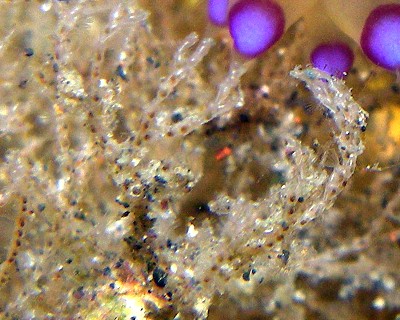
Dear Zeineb,
Yes this is Janolus sp. 4. Your photo nicely shows the branching bryozoan it lives and feeds on.
Best wishes,
Bill Rudman
Janolus sp. 4? from Singapore.
December 15, 2008
From: Toh Chay Hoon
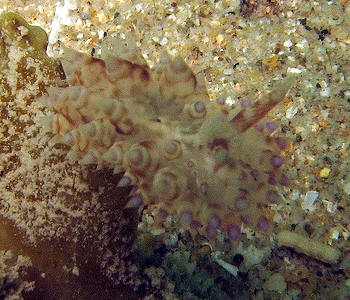
Concerning message #7100:
Dear Dr Bill,
This nudibranch was sighted on a sandy substrates while diving at Pulau Hantu, one of Singapore's southern islands. It looks similar to Janolus sp. 4.
It was moving pretty fast and I would say it's like how a big fat juicy caterpillar moves.
Locality: Pulau Hantu, 15 m , Singapore, South China Sea, 23 March 2008, Sandy Substrates. Length: 20 mm. Photographer: Toh Chay Hoon.
Toh Chay Hoon
sonnenflower@gmail.com
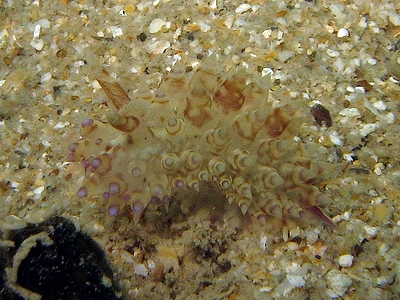
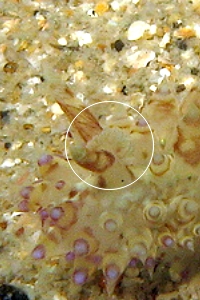
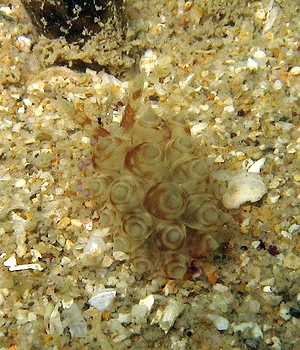
Dear Chay Hoon,
It is often difficult to determine if these aeolid-looking nudibranchs are aeolids or something else - perhaps even sacoglossans. Fortunately, as we can see in a close-up of one of your photos, this animal has the wrinkled ridge [caruncle] between the rhinophores which shows it is indeed a species of Janolus. Bernard Picton [message #21950] wondered whether there were two species in the group I am calling Janolus sp 4, so there si the possibility that there is more than one species involved. Your animal certainly falls into the range of colour pattern I am considering to be Janolus sp 4.
Best wishes,
Bill Rudman
Re: Janolus sp from Lambeh, Indonesia
October 9, 2008
From: Bernard Picton
Concerning message #20873:
Hi Bill,
I just noticed there seem to be two species within your Janolus sp.4 - one with red rhinophores with white tips and rings at the tip of the cerata, the other with white rhinophores with purple tips and purple caps to the rhinophores?
Bernard
Bernard.Picton@nmni.com
Picton, B. E., 2008 (Oct 9) Re: Janolus sp from Lambeh, Indonesia. [Message in] Sea Slug Forum. Australian Museum, Sydney. Available from http://www.seaslugforum.net/find/21950Dear Bernard,
You could be right, but I think they are all part of a continuum. In fact the photo on the Fact Sheet shows an animal with cerata of both colour patterns. The rhinophores do look a bit starkly different but seeing the variability in the ceratal colour pattern makes variability in the rhinophores more reasonable.
Best wishes,
Bill Rudman
Janolus sp from Lambeh, Indonesia
October 7, 2008
From: François Zylberman
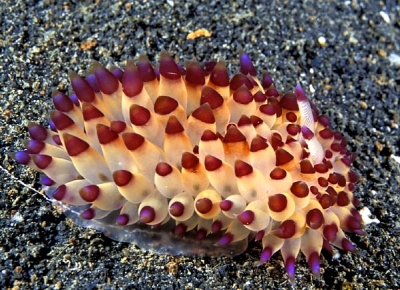
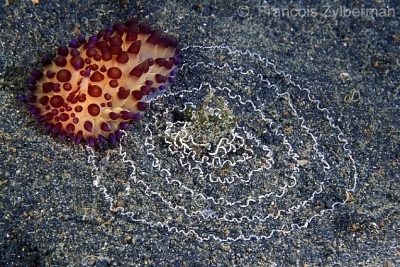
Dear Bill,
Could you help me to identify this nudibranch?
It is interesting to see how it lays its eggs directly on the sand.
Locality: Lambeh strait, 15 m, Indonesia, North Sulawesi, Indopacific, april 2006, muck dive. Length: 70 mm. Photographer: François Zylberman.
Many thanks.
François Zylberman
www.geodia.com
francois@geodia.com
Zylberman, F., 2008 (Oct 7) Janolus sp from Lambeh, Indonesia. [Message in] Sea Slug Forum. Australian Museum, Sydney. Available from http://www.seaslugforum.net/find/20873Dear François,
This is an unnamed species of Janolus I am calling Janolus sp. 4 on the Forum.It is certainly strange seeing it laying its eggs like this on a loose
Best wishes,
Bill Rudman
Janolus sp.4 from the Philippines
September 25, 2003
From: Erwin Köhler
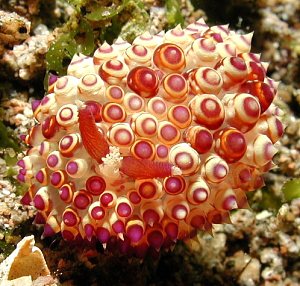
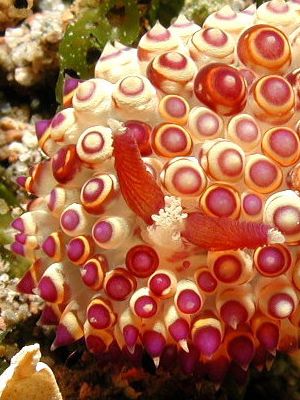
Dear Bill,
Here is Janolus sp.4 from the Philippines, Negros Oriental Island, Lipayo,
divesite, "Dauin".
Length: 44mm
Depth: 18m
Date: 07 May 2003
Cheers,
Erwin
Erwin@Philippine-Sea-Slugs.com
Köhler, E., 2003 (Sep 25) Janolus sp.4 from the Philippines. [Message in] Sea Slug Forum. Australian Museum, Sydney. Available from http://www.seaslugforum.net/find/10309Thanks Erwin,
The closeup of the head shows the shape of the rhinophores and the warty caruncle between them, very well
Best wishes
Bill Rudman
Janolus from Red Sea
May 2, 2003
From: Craig Copland
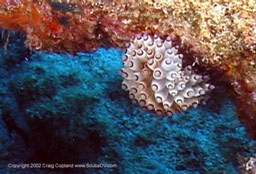
Hi
Please help me identify this nudibranch. We found it on the wreck of the Ulysses at Bluff Point, northwest Red Sea, Egypt on April 16, 2002 at appoximately 20 meters depth.
Thanks!
Craig Copland.
http://www.scubadv.com/gallery.htm
glugslug@scubadv.com
Dear Craig,
This is a species of Janolus which I have on the Forum as Janolus sp. 4. It seems to be widespread in the Indo-West Pacific. Species of Janolus are bryozoan feeders.
Best wishes,
Bill Rudman
Janolus sp. 4 from Philippines
August 11, 2002
From: Jeff Rosenfeld
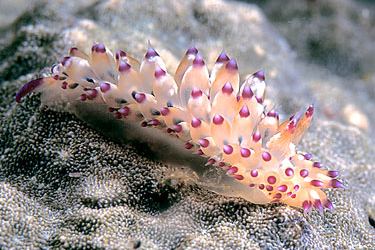
Bill,
Is this a known species or is it the species you are presently calling Janolus sp. 4? The photo was taken in Anilao, Luzon Island, Philippines in April, 2000.
Thanks.
Jeff
jhrosenfeld@seattleschools.org
Rosenfeld, J., 2002 (Aug 11) Janolus sp. 4 from Philippines. [Message in] Sea Slug Forum. Australian Museum, Sydney. Available from http://www.seaslugforum.net/find/7100Dear Jeff,
Yes this is 'Janolus sp. 4'
Cheers,
Bill Rudman
Janolus from Solomon Ids
January 11, 2001
From: Bruce Potter

Dear Bill,
While doing some filming of some anchor chains and attachments for some ship moorings in Honiara harbour, (Solomon Islands), I came across several of these. It was in a very muddy, silty harbour area, at about 12 meters. I have identified it as a Janolus. Are you able to add to that?
Thanks for your help.
Regards
Bruce Potter.
bruce.potter@adventist.org.sb
Potter, B., 2001 (Jan 11) Janolus from Solomon Ids. [Message in] Sea Slug Forum. Australian Museum, Sydney. Available from http://www.seaslugforum.net/find/3394Dear Bruce
This species is found throughout the Indo-West Pacific but does not appear to be particularly common. It is unnamed at present.
Bill Rudman
